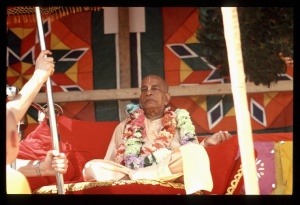CC Madhya 24.272: Difference between revisions
m (1 revision(s)) |
(Vanibot #0054 edit - transform synonyms into clickable links, which search similar occurrences) |
||
| (One intermediate revision by one other user not shown) | |||
| Line 1: | Line 1: | ||
{{ | [[Category:Sri Caitanya-caritamrta - Madhya-lila Chapter 24|C272]] | ||
<div style="float:left">'''[[Sri Caitanya-caritamrta|Śrī Caitanya-caritāmṛta]] - [[CC Madhya|Madhya-līlā]] - [[CC Madhya 24|Chapter 24: The Sixty-One Explanations of the Atmārāma Verse]]'''</div> | |||
<div style="float:right">[[File:Go-previous.png|link=CC Madhya 24.271|Madhya-līlā 24.271]] '''[[CC Madhya 24.271|Madhya-līlā 24.271]] - [[CC Madhya 24.273|Madhya-līlā 24.273]]''' [[File:Go-next.png|link=CC Madhya 24.273|Madhya-līlā 24.273]]</div> | |||
{{CompareVersions|CC|Madhya 24.272|CC 1975|CC 1996}} | |||
{{RandomImage}} | |||
==== TEXT 272 ==== | ==== TEXT 272 ==== | ||
<div | <div class="verse"> | ||
nārada kahe, | :nārada kahe,—"vyādha, ei nā haya āścarya | ||
hari-bhaktye hiṁsā-śūnya haya sādhu-varya | :hari-bhaktye hiṁsā-śūnya haya sādhu-varya | ||
</div> | </div> | ||
| Line 12: | Line 16: | ||
==== SYNONYMS ==== | ==== SYNONYMS ==== | ||
<div | <div class="synonyms"> | ||
nārada | ''[//vanipedia.org/wiki/Special:VaniSearch?s=nārada&tab=syno_o&ds=1 nārada] [//vanipedia.org/wiki/Special:VaniSearch?s=kahe&tab=syno_o&ds=1 kahe]'' — Nārada Muni said; ''[//vanipedia.org/wiki/Special:VaniSearch?s=vyādha&tab=syno_o&ds=1 vyādha]'' — my dear hunter; ''[//vanipedia.org/wiki/Special:VaniSearch?s=ei&tab=syno_o&ds=1 ei] [//vanipedia.org/wiki/Special:VaniSearch?s=nā&tab=syno_o&ds=1 nā] [//vanipedia.org/wiki/Special:VaniSearch?s=haya&tab=syno_o&ds=1 haya] [//vanipedia.org/wiki/Special:VaniSearch?s=āścarya&tab=syno_o&ds=1 āścarya]'' — this is not wonderful for you; ''[//vanipedia.org/wiki/Special:VaniSearch?s=hari&tab=syno_o&ds=1 hari]-[//vanipedia.org/wiki/Special:VaniSearch?s=bhaktye&tab=syno_o&ds=1 bhaktye]'' — by advancement in devotional service; ''[//vanipedia.org/wiki/Special:VaniSearch?s=hiṁsā&tab=syno_o&ds=1 hiṁsā]-[//vanipedia.org/wiki/Special:VaniSearch?s=śūnya&tab=syno_o&ds=1 śūnya] [//vanipedia.org/wiki/Special:VaniSearch?s=haya&tab=syno_o&ds=1 haya]'' — one becomes nonviolent and nonenvious; ''[//vanipedia.org/wiki/Special:VaniSearch?s=sādhu&tab=syno_o&ds=1 sādhu]-[//vanipedia.org/wiki/Special:VaniSearch?s=varya&tab=syno_o&ds=1 varya]'' — thus one becomes the best of honest gentlemen. | ||
</div> | </div> | ||
| Line 19: | Line 23: | ||
==== TRANSLATION ==== | ==== TRANSLATION ==== | ||
<div | <div class="translation"> | ||
"Nārada Muni said, 'My dear hunter, such behavior is not at all astonishing. A man in devotional service is automatically nonviolent. He is the best of gentlemen. | |||
</div> | </div> | ||
| Line 26: | Line 30: | ||
==== PURPORT ==== | ==== PURPORT ==== | ||
<div | <div class="purport"> | ||
In this verse the word sādhu-varya means | In this verse the word ''sādhu-varya'' means "the best of gentlemen." At the present moment there are many so-called gentlemen who are expert in killing animals and birds. Nonetheless, these so-called gentlemen profess a type of religion that strictly prohibits killing. According to Nārada Muni and Vedic culture, animal-killers are not even gentlemen, to say nothing of being religious men. A religious person, a devotee of the Lord, must be nonviolent. Such is the nature of a religious person. It is contradictory to be violent and at the same time call oneself a religious person. Such hypocrisy is not approved by Nārada Muni and the disciplic succession. | ||
</div> | </div> | ||
__NOTOC__ | |||
<div style="float:right; clear:both;">[[File:Go-previous.png|link=CC Madhya 24.271|Madhya-līlā 24.271]] '''[[CC Madhya 24.271|Madhya-līlā 24.271]] - [[CC Madhya 24.273|Madhya-līlā 24.273]]''' [[File:Go-next.png|link=CC Madhya 24.273|Madhya-līlā 24.273]]</div> | |||
__NOTOC__ | |||
__NOEDITSECTION__ | |||
Latest revision as of 23:06, 19 February 2024

A.C. Bhaktivedanta Swami Prabhupada
TEXT 272
- nārada kahe,—"vyādha, ei nā haya āścarya
- hari-bhaktye hiṁsā-śūnya haya sādhu-varya
SYNONYMS
nārada kahe — Nārada Muni said; vyādha — my dear hunter; ei nā haya āścarya — this is not wonderful for you; hari-bhaktye — by advancement in devotional service; hiṁsā-śūnya haya — one becomes nonviolent and nonenvious; sādhu-varya — thus one becomes the best of honest gentlemen.
TRANSLATION
"Nārada Muni said, 'My dear hunter, such behavior is not at all astonishing. A man in devotional service is automatically nonviolent. He is the best of gentlemen.
PURPORT
In this verse the word sādhu-varya means "the best of gentlemen." At the present moment there are many so-called gentlemen who are expert in killing animals and birds. Nonetheless, these so-called gentlemen profess a type of religion that strictly prohibits killing. According to Nārada Muni and Vedic culture, animal-killers are not even gentlemen, to say nothing of being religious men. A religious person, a devotee of the Lord, must be nonviolent. Such is the nature of a religious person. It is contradictory to be violent and at the same time call oneself a religious person. Such hypocrisy is not approved by Nārada Muni and the disciplic succession.